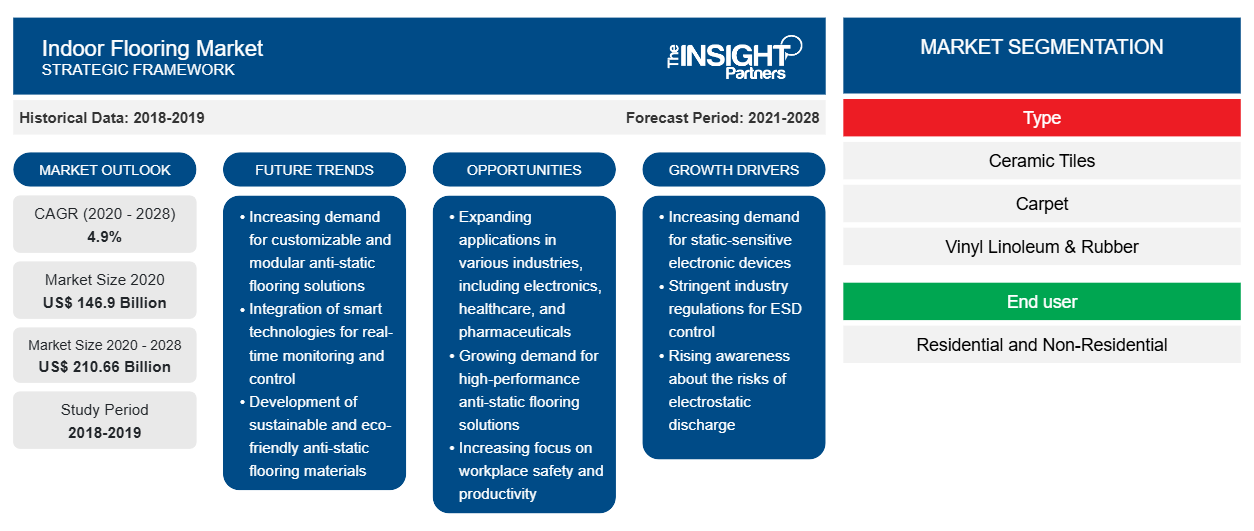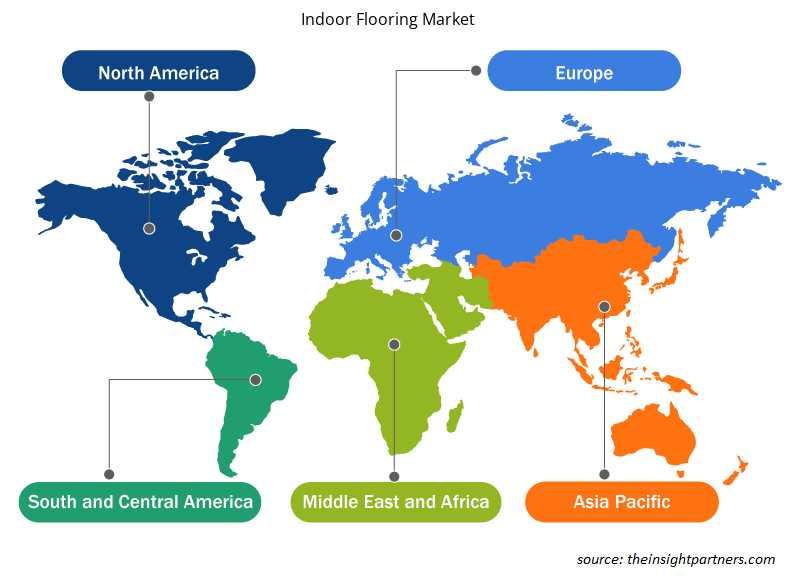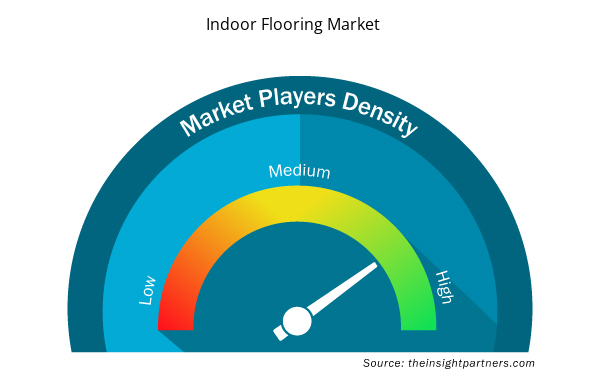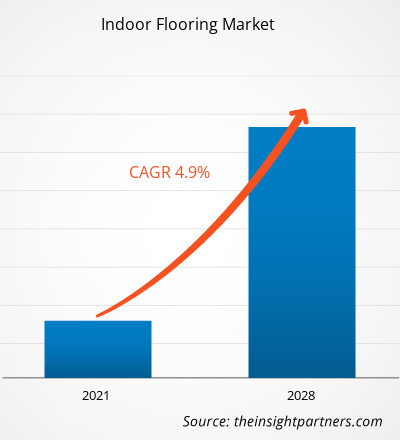[Research Report] The indoor flooring market was valued at US$ 146.90 billion in 2020, it is estimated to grow at a CAGR of 4.9% during the forecast period of 2021 to 2028.
In industrial settings such as warehouses, airplane hangars, assembly plants, paint shops, body shops, and distribution facilities, concrete floors are subject to wear and tear from exposure to harsh as well as corrosive chemicals and oils; they can also be damaged by scratches and abrasions caused by heavy machines and equipment such as airplanes and forklifts.
The rapid industrialization and establishment of manufacturing and processing plants in developing economies in APAC is driving the demand for floor coatings, and the pharmaceuticals, food & beverages, and automotive assembly industries are the key demand generators. Multinational corporations in Europe and America are expanding their operations in developing countries of APAC such as China and India. With renowned manufacturers setting up their operational facilities in the countries in this region, the demand for the industrial-grade floor coatings is also increasing. The rise in demand has been encouraging the indoor flooring market platers to introduce advanced and generic products, thereby driving the indoor flooring market
Customize This Report To Suit Your Requirement
You will get customization on any report - free of charge - including parts of this report, or country-level analysis, Excel Data pack, as well as avail great offers and discounts for start-ups & universities
Indoor Flooring Market: Strategic Insights

- Get Top Key Market Trends of this report.This FREE sample will include data analysis, ranging from market trends to estimates and forecasts.
You will get customization on any report - free of charge - including parts of this report, or country-level analysis, Excel Data pack, as well as avail great offers and discounts for start-ups & universities
Indoor Flooring Market: Strategic Insights

- Get Top Key Market Trends of this report.This FREE sample will include data analysis, ranging from market trends to estimates and forecasts.
Impact of COVID-19 Pandemic on Indoor Flooring Market
The COVID-19 outbreak has significantly impacted infrastructure development and the global economy. International response to the rapid disruption to key infrastructure sectors and industries is ongoing. According to the latest situation report from World Health Organization, the US, India, Brazil, Russia, the UK, France, Spain, and Italy are among the worst affected countries due to the COVID-19 outbreak. The outbreak first began in Wuhan (China) in December 2019, and since then, it has spread across the globe. The COVID-19 crisis has affected the industries worldwide. The global economy was adversely affected in 2020, which is likely to continue in 2021. The pandemic has disturbed indoor flooring businesses and suppliers around the globe. Market players experienced disruptions in their operations, and they are likely to face consequences till mid-2021. The factory shutdowns, trade bans, and border lockdowns have adversely affected the indoor flooring industry. On the flipper side, the market is opening in 2021 so it expected to gain traction in the near future.
Indoor Flooring Market Insights
Increasing Use of Floor Coatings in Sports Complexes
Floor coating systems used in indoor and outdoor sports arenas need the right combination of properties such as excellent point elasticity, skid resistance, surface elasticity, and rebound. They should also be extremely durable, while displaying excellent optical characteristics and compatibility with commonly used coloring materials and additives. High-performance polyurethane floor coatings impart excellent elasticity and good grip to surfaces while allowing players to be agile and move skillfully on the court, which makes it a preferred material for coating floors in indoor sports halls; tennis, volleyball, and basketball courts; and wrestling and gymnastic halls. The rising expenditure by governments and private construction companies in building sports complexes and arenas has led to the development of numerous sports facilities in urban as well as suburban areas, which are likely to generate a high demand for specialized high-performance indoor flooring materials in the coming years.
Type-Based Market Insights
Based on type, the indoor flooring market is categorized into ceramic tiles, carpet, vinyl linoleum & rubber, wood & laminate, and others. The ceramic tiles segment dominated the indoor flooring market. Ceramic tiles are widely used to enhance the floors of houses, hospital rooms, and toilets. They are extensively available in the market. Ceramic is also known as porcelain. Ceramic tiles are also used for flooring and walls. They are available in a broad range of varieties based on textures, patterns, and sizes. In the global and the local markets, many players offer different types of related products.
The players operating in the indoor flooring market focus on strategies such as mergers, acquisitions, and market initiatives to maintain their positions in the market. A few developments by key players are listed below:
- In 2020, according to state and local economic development sources, Shaw Industries Group invested US$ 20 million to build a new space in Ringgold. The company plans to occupy the new space in Ringgold, on or about June 1, 2021.
- In 2018, Interface Extends Reach into Performance Flooring with Acquisition of Rubber Flooring Company
Indoor Flooring Market Regional Insights
The regional trends and factors influencing the Indoor Flooring Market throughout the forecast period have been thoroughly explained by the analysts at Insight Partners. This section also discusses Indoor Flooring Market segments and geography across North America, Europe, Asia Pacific, Middle East and Africa, and South and Central America.

- Get the Regional Specific Data for Indoor Flooring Market
Indoor Flooring Market Report Scope
| Report Attribute | Details |
|---|---|
| Market size in 2020 | US$ 146.9 Billion |
| Market Size by 2028 | US$ 210.66 Billion |
| Global CAGR (2020 - 2028) | 4.9% |
| Historical Data | 2018-2019 |
| Forecast period | 2021-2028 |
| Segments Covered |
By Type
|
| Regions and Countries Covered | North America
|
| Market leaders and key company profiles |
Indoor Flooring Market Players Density: Understanding Its Impact on Business Dynamics
The Indoor Flooring Market is growing rapidly, driven by increasing end-user demand due to factors such as evolving consumer preferences, technological advancements, and greater awareness of the product's benefits. As demand rises, businesses are expanding their offerings, innovating to meet consumer needs, and capitalizing on emerging trends, which further fuels market growth.
Market players density refers to the distribution of firms or companies operating within a particular market or industry. It indicates how many competitors (market players) are present in a given market space relative to its size or total market value.
Major Companies operating in the Indoor Flooring Market are:
- Forbo International SA
- Mats Inc.
- Tarkett
- Armstrong Flooring, Inc.
- Beaulieu International Group
Disclaimer: The companies listed above are not ranked in any particular order.

- Get the Indoor Flooring Market top key players overview
The global indoor flooring market has been segmented as follows:
Global Indoor Flooring Market – by Type
- Ceramic Tiles
- Carpet
- Vinyl Linoleum & Rubber
- Wood & Laminate
- Others
Global Indoor Flooring Market – by End User
- Residential
- Non-Residential
Global Indoor Flooring Market – by Geography
- North America
- US
- Canada
- Mexico
- Europe
- France
- Germany
- Italy
- Russia
- UK
- Rest of Europe
- Asia Pacific (APAC)
- China
- India
- Japan
- Australia
- South Korea
- Rest of APAC
- Middle East & Africa (MEA)
- Saudi Arabia
- UAE
- South Africa
- Rest of MEA
- South & Central America (SCAM)
- Brazil
- Argentina
- Rest of SCAM
Company Profiles
- Forbo International SA
- Mats Inc.
- Tarkett
- Armstrong Flooring, Inc.
- Beaulieu International Group
- Ecore International
- Interface, Inc.
- Toli Corporation
- Mohawk Industries, Inc.
- Shaw Industries Group, Inc.
- Historical Analysis (2 Years), Base Year, Forecast (7 Years) with CAGR
- PEST and SWOT Analysis
- Market Size Value / Volume - Global, Regional, Country
- Industry and Competitive Landscape
- Excel Dataset



Report Coverage
Revenue forecast, Company Analysis, Industry landscape, Growth factors, and Trends

Segment Covered
Type and End user

Regional Scope
North America, Europe, Asia Pacific, Middle East & Africa, South & Central America

Country Scope
Argentina, Australia, Brazil, Canada, China, France, Germany, India, Italy, Japan, Mexico, Russian Federation, Saudi Arabia, South Africa, South Korea, United Arab Emirates, United Kingdom, United States
Frequently Asked Questions
Which type is expected to dominate the market in the forecast period?
The indoor flooring market is led by ceramic tiles segment with highest share and is expected to dominate in the forecast period. The ceramic tiles are widely used to enhance the floors of houses, hospital rooms, toilets, and others. It is extensively available in the market. It is also known as porcelain. The ceramic tiles are used for flooring and walls. It is available in a broad range of varieties based on textures, patterns, and sizes. In the global and the local markets, many players offer different types of related products
What are reasons behind indoor flooring market growth?
Rise in number of commercial and residential construction projects. Moreover, surge in product innovations and launches, thereby substantially driving the automated guided vehicles (AGV) market.
What are market opportunities for indoor flooring market?
Floors coating systems used in indoor and outdoor sports arenas need the right combination of properties such as excellent point elasticity, skid resistance, surface elasticity, and rebound properties. They should also be extremely durable, while displaying excellent optical characteristics and compatibility with commonly used coloring materials and additives. High-performance polyurethane floor coatings impart excellent elasticity and good grip to surfaces while allowing players to be agile and move skillfully on the court, which makes it a preferred material for coating floors in indoor sports halls; tennis, volleyball, and basketball courts; and wrestling and gymnastic halls. The rising expenditure by government and private construction companies in building sports complexes and arenas has led to the development of numerous sports facilities in urban as well as suburban areas, which are likely to generate a high demand for specialized high-performance indoor flooring materials in the coming years.
Trends and growth analysis reports related to Manufacturing and Construction : READ MORE..
The List of Companies - Indoor Flooring Market
- Forbo International SA
- Mats Inc.
- Tarkett
- Armstrong Flooring, Inc.
- Beaulieu International Group
- Ecore International
- Interface, Inc.
- Toli Corporation
- Mohawk Industries, Inc.
- Shaw Industries Group, Inc.

 Get Free Sample For
Get Free Sample For